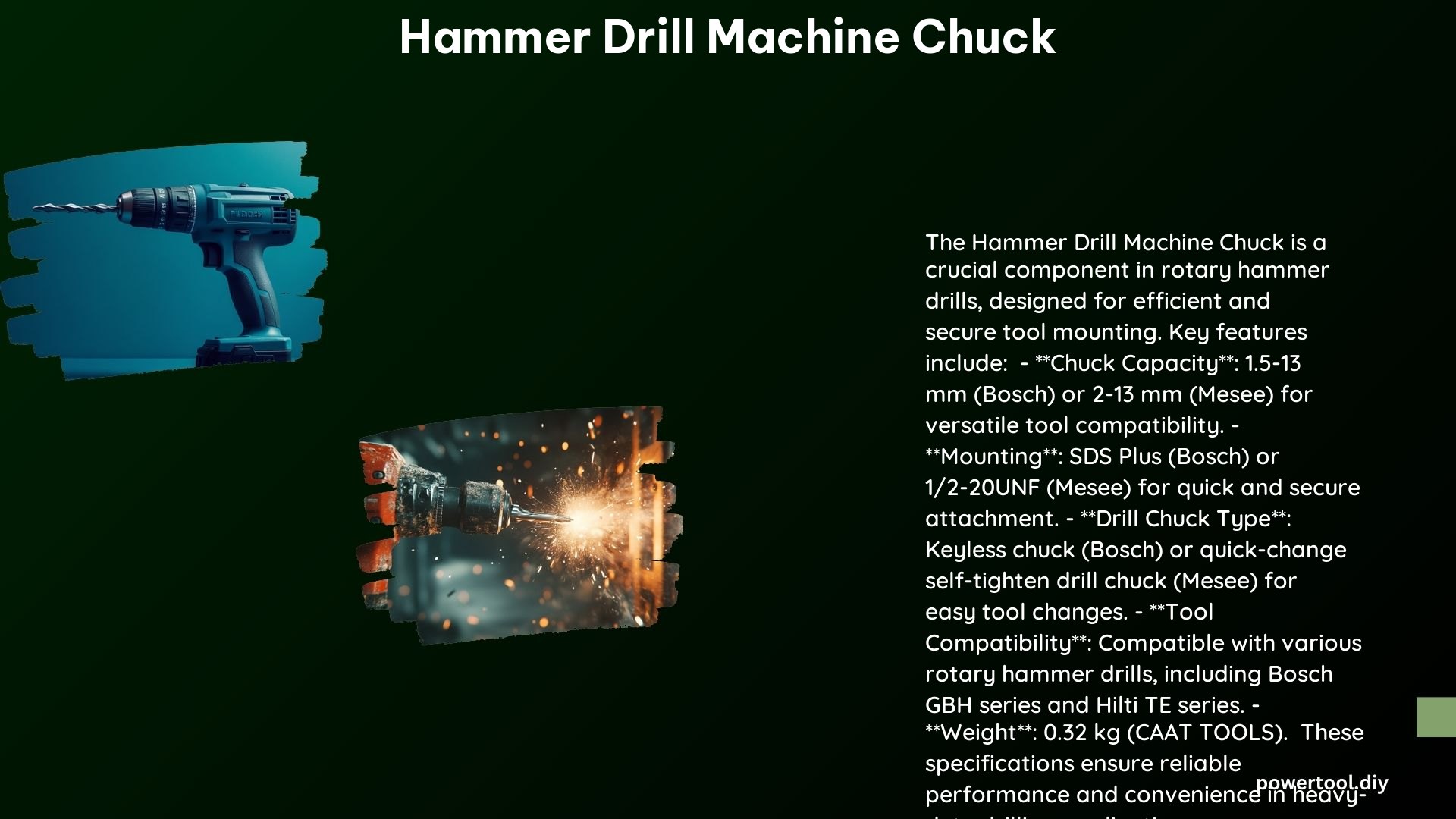Hammer drill machine chucks are essential components that allow users to securely attach and detach drill bits in rotary hammer drills. These specialized chucks play a crucial role in ensuring the efficient and safe operation of these powerful tools. In this comprehensive guide, we will delve into the main types of drill chucks used in hammer drill machines, their key features, maintenance tips, and technical specifications to help you make informed decisions when selecting and maintaining your hammer drill equipment.
Main Types of Drill Chucks Used in Hammer Drill Machines
Keyless Chuck
Keyless chucks are the most common type used in rotary hammer drills. These chucks do not require a key to tighten or loosen the drill bit, making bit changes quick and easy. Keyless chucks are compatible with a wide range of drill bit diameters, typically ranging from 1.5 to 13 mm. They feature a self-locking mechanism that grips the drill bit securely, reducing the risk of slippage during operation.
Keyed Chuck
While less common in rotary hammer drills, keyed chucks are still used in some models. These chucks require a specialized key to tighten or loosen the drill bit. Keyed chucks offer a more secure grip on the drill bit compared to keyless chucks, making them suitable for heavier-duty applications. However, the need for a key can slow down the bit-changing process.
SDS-Style Chuck
SDS (Slotted Drive System) chucks are designed specifically for use with rotary hammer drills. These chucks feature a slotted drive system that allows for a secure and efficient connection between the chuck and the drill bit. SDS-style chucks are typically used for heavy-duty drilling tasks and are compatible with SDS drill bits, which have a unique shank design to fit the slotted drive system.
Proper Lubrication and Maintenance of the Chuck

Regular Cleaning
To ensure optimal performance and longevity, it is essential to regularly clean the chuck. Remove any debris, dust, or grime that may have accumulated on the chuck’s surface and moving parts. This can be done using a clean cloth or a soft-bristled brush.
Lubrication
Applying a small amount of lubricant, such as silicone spray or grease, to the chuck’s moving parts can help reduce friction and wear. This regular lubrication will help maintain smooth operation and extend the lifespan of the chuck.
Tightening
Ensure that the chuck is properly tightened to the drill’s spindle. A loose chuck can cause the drill bit to become unstable during operation, leading to potential damage to the chuck, the drill, or the workpiece.
Key Differences Between SDS-Style and 3-Jaw Style Chucks
Design
SDS-style chucks feature a slotted drive system that allows for a secure and efficient connection between the chuck and the drill bit. In contrast, 3-jaw style chucks have three jaws that grip the drill bit.
Compatibility
SDS-style chucks are designed specifically for use with SDS drill bits, which have a unique shank design to fit the slotted drive system. 3-jaw style chucks, on the other hand, are compatible with a wider range of drill bit types.
Application
SDS-style chucks are typically used for heavy-duty drilling tasks, such as concrete, masonry, or reinforced materials. 3-jaw style chucks are more suitable for lighter drilling applications, such as wood or soft metals.
Technical Specifications of Hammer Drill Machine Chucks
Chuck Capacity
The chuck capacity refers to the range of drill bit diameters that the chuck can accommodate. For example, a chuck with a capacity of 1.5-13 mm can handle drill bits within that size range.
Mount Type
The mount type determines how the chuck is attached to the hammer drill. Common mount types include SDS Plus, SDS Max, and keyed chucks with a threaded or tapered connection.
Drill Chuck Type
The type of chuck used, such as keyless, keyed, or SDS-style, is an important specification to consider when selecting a hammer drill machine chuck.
DIY Tips
Regular Maintenance
Regularly cleaning and lubricating the chuck is essential to ensure smooth operation and extend its lifespan. Follow the manufacturer’s recommendations for the appropriate cleaning and lubrication methods.
Proper Bit Selection
Choose the right drill bit for the task at hand to avoid damaging the chuck or the drill. Consult the manufacturer’s guidelines or specifications to ensure compatibility and suitability.
Chuck Replacement
If the chuck becomes damaged or worn out, replace it with a compatible model to maintain the hammer drill’s performance and safety.
Reference Links
- Bosch Professional – Keyless Drill Chucks with Adapter: https://www.bosch-professional.com/sa/en/keyless-drill-chucks-with-adapter-2869005-ocs-ac/
- Walmart – Hammer Drill Chuck: https://www.walmart.com/c/kp/hammer-drill-chuck
- Amazon – Quick-Change Bit Hammer Drill Chuck: https://www.amazon.com/Quick-Change-Hammer-Drill-Premium-Quality/dp/B07CJWRVWK
By understanding the different types of hammer drill machine chucks, their features, and proper maintenance practices, you can ensure the efficient and safe operation of your rotary hammer drill, whether you’re tackling heavy-duty construction projects or DIY tasks around the home.
